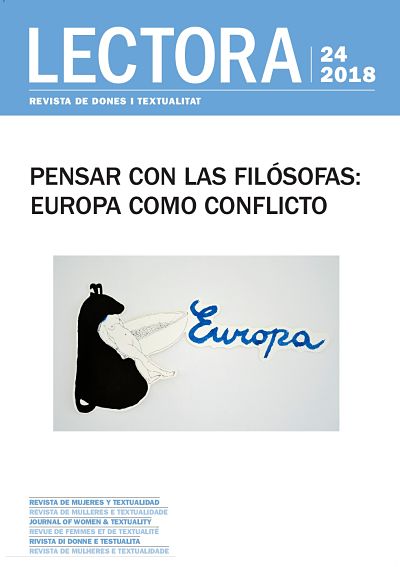Europe from the Perspective of María Zambrano's Exile
DOI:
https://doi.org/10.1344/Lectora2018.24.3Keywords:
María Zambrano, Europe, exile, crisis, creation, cityAbstract
The aim of this essay is to highlight the particularity of María Zambrano's thought by taking her treatment of the theme of Europe as reference point and to, ultimately, underline the possible relevance of her contribution to the challenges facing Europe today. To do this, I propose a rereading of the pages that the author explicitly devotes to this problem, pointing out the affinities that exist with certain approaches in the current philosophical debate, to which Zambrano's thought is significantly tuned.
References
Brague, Rémi (1995), Europa, la vía romana, Juan Miguel Palacios (trad.), Madrid, Gredos.
Bundgård, Ana (1998), "El binomio España-Europa en el pensamiento de
Zambrano, Ferrater Mora y Ortega y Gasset", Claves de la razón poética,
Carmen Revilla (ed.), Madrid, Trotta: 43-56.
Cacciari, Massimo (2007), Europa o la filosofía, Madrid, Antonio Machado.
Forti, Simona (2004), La filosofia di fronte all’estremo. Totalitarismo e riflessione
filosofica, Milán, Einaudi.
Havel, Václav (2004), "Storie e totalitarismo", La filosofia di fronte all’estremo.
Totalitarismo e riflessione filosofica, Simona Forti (ed.), Milán, Einaudi.
Heidegger, Martin (1999), L'Europa e la filosofia, Venecia, Marsilio.
Rella, Franco (2004), Dall'esilio. La creazione artistica come testimonianza, Milán, Feltrinelli.
Sloterdijk, Peter (2004), Si Europa despierta. Reflexiones sobre el programa de una potencia mundial en el fin de la era de su ausencia política, Germán Cano
(trad.), Valencia, Pre-textos.
Steiner, George (2017), La idea d'Europa, Barcelona, Arcàdia.
Weil, Simone (1995), Pensamientos desordenados, María Tabuyo y Agustín López (trads.), Madrid, Trotta.
—(2000), Escritos de Londres y últimas cartas, Maite Larrauri (trad.), Madrid,
Trotta.
—(2005), La fuente griega, José Luis Escartín y María Teresa Escartín (trads.),
Madrid, Trotta.
Zambrano, María (1988), Persona y democracia. La historia sacrificial, Barcelona, Anthropos.
—(1990), Los bienaventurados, Madrid, Siruela.
—(1993), El hombre y lo divino, Madrid, FCE.
—(1994), España, sueño y verdad, Madrid, Siruela.
—(1996), La Cuba secreta y otros ensayos, Madrid, Endimión.
—(2000a), La agonía de Europa, Madrid, Trotta.
—(2000b), Hacia un saber sobre el alma, Madrid, Alianza.
—(2001), "La ciudad", Aurora. Papeles del "Seminario María Zambrano", 3: 141-
142.
—(2002), "La crisis de la cultura de Occidente", Con dados de niebla: 58-61. [1964]
—(2004), "Carta sobre el exilio", La razón en la sombra, Jesús Moreno Sanz (ed.), Madrid, Siruela. [1961]
—(2009), Las palabras del regreso, Mercedes Gómez Blesa (ed.), Madrid, Cátedra.
Downloads
Published
How to Cite
Issue
Section
License
The Author retains ownership of the copyright in this article and grants Lectora: revista de dones i textualitat the rights to print publication of the Article. The work will be available under a Creative Commons Attribution-Noncommercial-No Derivative Works license, by which the article must be credited to the Author and the Journal be credited as first place of publication.
The Author is free to enter in seperate, additional contractual agreements for the non-exclusive distribution of the work as published in this journal (such as institutional repositories or a book), as long as the original publication in Lectora is credited.
The Author is encouraged to post the work online (eg in institutional or thematic repositories, or in their website), as it can lead to productive exchanges as well as to a greater citation of the published work (see The Effect of Open Access).





